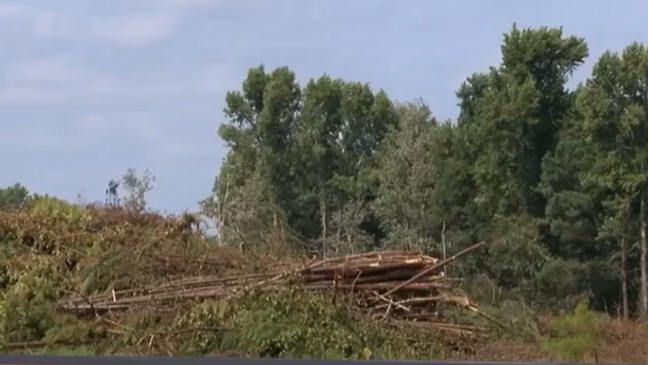Guest post written by Patricia D’Ascoli

The setting is Myrtle Beach, South Carolina, a lovely, ever expanding city that invites tourists and retirees. I am of the latter category. Although a recent transplant, I find myself objecting to the burgeoning housing almost as heartily as a native. But on the other hand, not really, because I have no idea what this coastal town looked like in days gone by, before monster hotels and multi-story condos intruded upon the “Grand Strand” as it is called, wiping out unobtrusive motels and filling up the shoreline with sun blotting structures.
What I do know is that in the two years I have lived here, residential developments have lain waste to acres of forested land; stately pines have been murdered and hauled away to meet their fate in the shredder. Perhaps they will become mulch. But in their absence, the bare, brown ground sits littered with stumps and branches. Birds and other wildlife have evacuated; there is nothing left for them to feed on or nest in. Monsters sit poised upon this land—great excavators and bulldozers await their instructions from greedy developers.
Homeowners in the vicinity weep. I think they do at least, as they see another development going up in their backyards. How quickly they forget that not too long ago, their own pretty neighborhood was a forest. When I say pretty, I don’t mean that at all. Developments less than ten years old are devoid of meaningful foliage. Palmettos planted uniformly grace every front yard. Scrappy bushes pass for hedges. Fake ponds attempt to break up the monotony of beige houses that all look alike.
This is what once proud trees have been sacrificed for.
I live in a condo overlooking a beautiful golf course that has recently been closed. Holes and pipes dot the landscape where manicured greens once welcomed golfers. Soon construction will begin on a new residential development that will feature 220 single family homes. “No Trespassing-Construction Zone” signs have been posted at strategic locations to warn asylum seeking walkers to stay away. The paths along the course are now forbidden territory.
My view of pine trees, luscious Bermuda grass, whimsical sand traps and peaceful ponds will be obliterated. The sounds of excavation and building will disrupt the tranquility I have enjoyed for two years. What was once protected land will be destroyed.
There are almost 100 golf courses in Myrtle Beach. Each course is an oasis amidst the arid landscape of ever expanding residential and commercial development. I am not a golfer, but I enjoy living on a golf course, as many residents do. Several courses were forced to close during the pandemic, and it remains to be seen whether they will reopen or if their owners will be forced to sell to builders. Many homeowners who currently enjoy a golf course view will no doubt have to contend with the decimation of charming vistas.
I am devastated by the take down of defenseless forests. If the lands were destined to be golf courses, the destruction of trees would be a little less painful to me. Just a little. In my own neighborhood in Carolina Forest, several arboreal graveyards along River Oaks Drive will soon house unattractive commercial complexes and nondescript neighborhoods. It is heartbreaking to see once magnificent woodlands wiped out.
As a concerned citizen perhaps it is my duty to make my voice known—to get involved with local groups fighting against further development. For such development will surely affect the environment, strain water and sanitation systems, increase flooding, impact the infrastructure, and put greater demands on emergency services.
I could attend zoning meetings. I could write letters to council members. And yet, it is not fair for me to oppose such development. I would be a hypocrite. After all, I escaped to Myrtle Beach; I sought haven in a place where the weather is warm and beaches beckon year-round. A place where property taxes are low and housing prices are relatively reasonable. So how can I begrudge those who follow in my footsteps? Should they not be allowed to experience all this area has to offer?
In the end, they will come. Perhaps they will not object as I have to the charmless developments springing up throughout the area. It is likely they will, in fact, occupy the beige houses that sit upon land once covered with splendid pine trees. And they will enjoy Myrtle Beach, oblivious as I was to how it looked once upon a time.


Leave a Reply